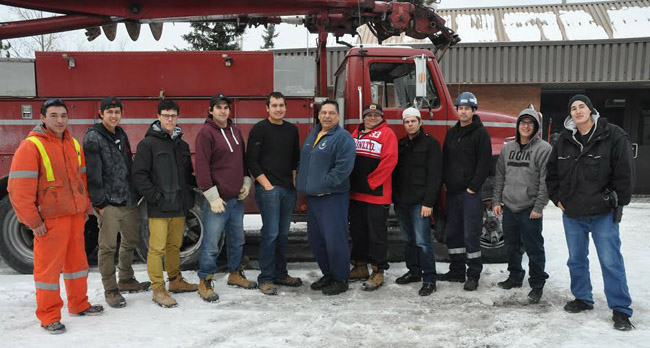Powerline training feeds industry need

David Pangowish, Steven Peshabo , Sean Contin, Robert Couchie, Dustin Debassige, Gerald Debassige, Chad Commanda, Richard Fournier, Thomas McKenzie, John Moss, James Boucher. Absent: Gilbert Dokis. – Photo by Infrastructure Health & Safety Association
By Heather Campbell
SUDBURY – A dozen First Nation participants enrolled in a Gezhtoojig Employment program that makes them work-ready for jobs in powerline and construction.
Graduate Tom McKenzie, a citizen of Temagami First Nation, landed a job interview before graduation.
“By going through this course I have become confident. First thing I accomplished that meant something to me,” he says.
McKenzie was in the first class of graduates to complete the certificate in Aboriginal Line Crew Ground Support program, intensive 15-week hands-on training offered by the Infrastructure Health and Safety Association (IHSA), Gezhtoojig Employment and Training and Cambrian College. All 12 students accepted into the Gezhtoojig program graduated from the training, which has equipped them with work-ready skills including electrical safety, construction health and safety, defensive driving techniques, and mobile crane operation.
Greg Williamson, director, high-risk activity training and evaluation with IHSA said there is a demand in the powerline industry for workers trained in these skills who are also mobile. Ontario’s infrastructure has been undergoing upgrading and older workers are retiring, creating the need for more workers in the field.
The line crew ground support workers are in the field alongside powerline technicians who are responsible for the construction, maintenance and repair of overhead and underground electrical power transmission and distribution systems that make up the electrical power grid.
Tom McKenzie said the training emphasized the importance of teamwork in contributing to worksite health and safety.
“We began to care about each other’s safety and that we all got through the program,” he says. “We would study together and make decisions as a group. No one was getting left behind.”
Gezhtoojig Employment and Training monitors graduates for six months and can negotiate wage subsidies in order to get them hired.
Carey Gilligan, Powerline Technician Training with IHSA and the primary instructor for the program, said the graduates should see employment doors open for them immediately.
Gilligan spent most of the instruction time outside, “three weeks working in the swamp and that’s when they realized this is hands-on, not just sitting in class.”
The trainer said the in-field experience was a confidence-builder for participants, and helped develop teamwork among them..
“They have to have their co-workers backs. They were all taught this the first week, and they all bought into it,” said Gilligan.
They had to work together to solve problems whether it was what time they took lunch or cutting down a tree and constructing a hydro pole.
There will be three more intake periods into the powerline ground crew program over the next two years, with the next one in Spring 2014. Organizers anticipate that some graduates will want to explore the two-year Powerline Technician program.
Gezhtoojig Employment and Training is a circle of Anishinabek people with a vision of self-determination and works to foster and direct Aboriginal employment, training and business development initiatives. To find out more about the program and next intake, call Ron Sarazin, special projects coordinator, rons@gezhtoojig.ca or (705) 524-6772.

